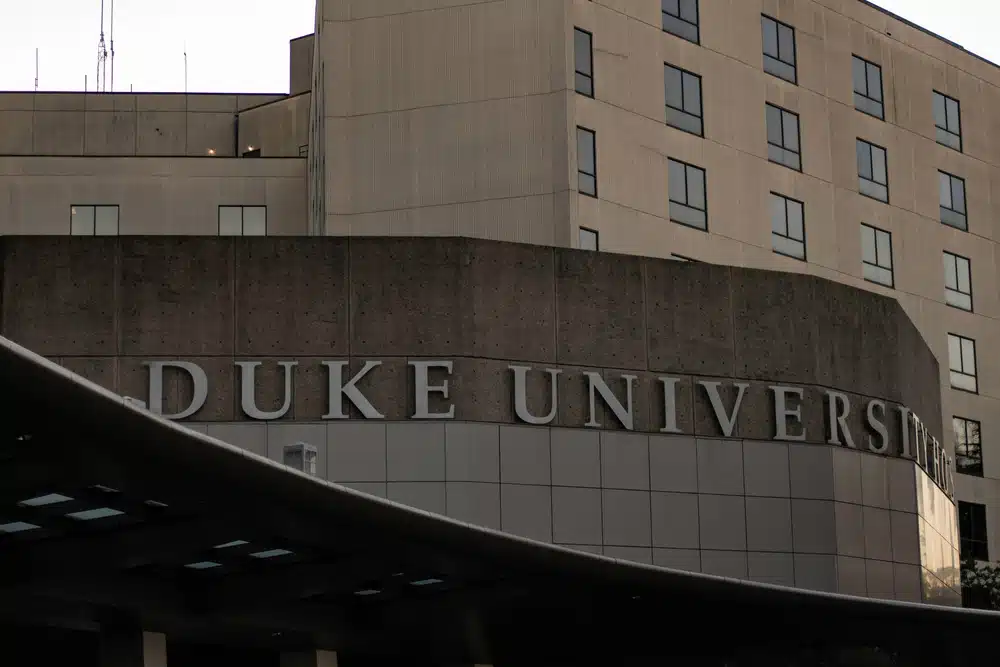Everything You Need To Know About Duke University Admissions
Embarking on Duke University admissions is not merely about securing a seat at one of the world’s most prestigious institutions; it’s about aligning yourself with a legacy of excellence and a community that fosters innovation and lifelong learning. The path to becoming a Blue Devil is more than just a journey, it’s an adventure of self-discovery, resilience, and intellectual pursuit.
With its prestigious academic programs, vibrant campus community, and wide range of extracurricular opportunities, Duke is one of the most sought-after universities in the country. In this comprehensive guide, we’ll take you through everything you need to know about Duke University admissions, from understanding the application requirements to tips for crafting a compelling personal statement.
A Brief Overview of Duke University
Founded in 1838, Duke University is a private research university located in Durham, North Carolina. The university was named after James B. Duke, a tobacco magnate who provided a $40 million endowment to establish the institution. With a campus spanning over 8,600 acres, Duke is one of the largest private universities in the United States.
Duke University is renowned for its academic excellence and research programs. The university has consistently been ranked among the top 10 universities in the United States and is a member of the prestigious Association of American Universities.
Duke offers a wide variety of undergraduate and graduate degree programs across ten schools and colleges, including the Trinity College of Arts and Sciences, the Pratt School of Engineering, the Fuqua School of Business, and the Sanford School of Public Policy.
The Trinity College of Arts and Sciences is the largest school at Duke and offers over 40 undergraduate majors and minors. The Pratt School of Engineering is known for its cutting-edge research in fields such as biomedical engineering and environmental engineering.
The Fuqua School of Business is consistently ranked among the top business schools in the world and offers MBA, Executive MBA, and PhD programs. The Sanford School of Public Policy is dedicated to promoting public service and leadership and offers undergraduate and graduate degree programs in public policy and international development.
Duke University is also home to a vibrant campus community. With over 400 student organizations, there are plenty of opportunities for students to get involved and pursue their interests outside of the classroom. The university also has a rich athletic tradition and is a member of the Atlantic Coast Conference. The Duke Blue Devils have won national championships in basketball, lacrosse, and soccer.
Overall, Duke University is a world-class institution that offers a rigorous academic experience and a vibrant campus community. This is why a positive decision from Duke University admissions has a great impact on upcoming college students. Whether you’re interested in pursuing a degree in the arts, sciences, engineering, business, or public policy, Duke has something to offer.
Understanding the Admissions Process
Applying to Duke University can seem like a daunting process, but with the right preparation, you can navigate it successfully. Here’s what you need to know about the admissions process:
Application Deadlines and Requirements
The first step in the application process is to determine the application deadline that applies to you. Duke operates on a rolling admissions basis, which means that there are no set application deadlines. However, there are recommended application deadlines for students applying under Early Decision or Regular Decision plans.
For instance, the recommended deadline for Early Decision applicants is November 1st, while the Regular Decision deadline is January 2nd. This means that you can apply to Duke anytime between September and March, but it’s best to apply as early as possible to increase your chances of admission.
When it comes to application requirements, Duke requires students to submit their transcripts, standardized test scores, and letters of recommendation. Additionally, you’ll need to complete the Common Application, Coalition Application, or QuestBridge Application, and pay the $85 application fee.
Early Decision vs. Regular Decision
One of the most critical decisions you’ll make during the application process is whether to apply under Early Decision or Regular Decision. Early Decision is a binding program that requires you to commit to enrolling at Duke if you’re accepted. This means that you’ll need to withdraw your applications from other colleges and universities and submit your enrollment deposit to Duke. In contrast, Regular Decision is non-binding, and you’ll have until May 1st to make your enrollment decision.
It’s essential to weigh the pros and cons of each option carefully. Early Decision can increase your chances of being successful in Duke University admissions, but it also means that you’ll need to commit to Duke before hearing back from other colleges. Regular Decision, on the other hand, gives you more time to consider your options but may be more competitive.
The Role of Standardized Test Scores
Your SAT or ACT scores will be an essential part of your application to Duke. While there’s no minimum score requirement, the average SAT score for admitted students is 1500, and the average ACT score is 34. It’s recommended that you take these tests no later than December of your senior year, as scores must be submitted by February 15th. However, Duke operates under a test-optional policy, meaning that you can choose whether or not to submit your scores as part of your application.
If you decide not to submit your scores, you’ll need to provide additional information to help the admissions committee evaluate your academic potential. This may include your high school GPA, class rank, and course rigor.
The Importance of Extracurricular Activities
Duke values students who are engaged in their communities and have pursued their passions outside the classroom. Be sure to highlight your extracurricular activities on your application, including any leadership positions or awards you’ve received. This can include anything from playing a sport or volunteering at a local non-profit to starting your own business or participating in a research project.
When describing your extracurricular activities, be sure to focus on the impact you’ve made and the skills you’ve developed. This can help demonstrate your leadership potential and commitment to making a difference in the world.
Letters of Recommendation and Personal Essays
Your personal essays and letters of recommendation are your chance to showcase your unique qualities and experiences. Be honest and authentic in your writing, and use your essays to tell your story and demonstrate your fit with Duke’s values and mission.
When choosing who to ask for a letter of recommendation, think about people who know you well and can speak to your academic potential, leadership skills, and character. This may include teachers, coaches, mentors, or employers.
Finally, don’t be afraid to ask for help if you need it. The Duke University admissions committee is always available to answer your questions and provide guidance throughout the application process.
Duke University’s Academic Programs
One of the most significant advantages of attending Duke University is its wide range of academic programs. Here’s a closer look at some of the most popular undergraduate majors and minors at Duke:
Popular Majors and Minors
Duke offers over 50 majors and 50 minors across a wide variety of disciplines, from computer science to anthropology to public policy. Some of the most popular undergraduate majors at Duke include biology, economics, psychology, and public policy.
In the biology department, students have the opportunity to participate in groundbreaking research projects that explore topics such as genetic engineering and stem cell research. The economics department offers courses that cover topics such as micro and macroeconomics, econometrics, and financial economics.
Students in the psychology department can explore fascinating topics such as cognitive psychology, social psychology, and abnormal psychology. The public policy program allows students to explore pressing issues such as healthcare policy, environmental policy, and international development.
Research Opportunities
As a top-tier research university, Duke offers many opportunities for students to get involved in cutting-edge research projects. These research opportunities can provide valuable experience and help you build your professional network.
Research opportunities are available in a wide variety of fields, from biomedical engineering to environmental science. For example, the Duke Global Health Institute offers research opportunities for students interested in global health issues such as HIV/AIDS, malaria, and tuberculosis. The Duke Center for Environmental Solutions offers research opportunities for students interested in studying climate change, renewable energy, and sustainable agriculture.
Study Abroad Programs
Duke offers numerous study abroad opportunities, ranging from short-term summer programs to full-year study abroad options. Studying abroad can be a valuable way to expand your perspectives, gain cross-cultural experience, and develop language skills.
Students can choose from a wide variety of study abroad programs, including those in Europe, Asia, Africa, and South America. It is important to do research while still in the process of sending an application to Duke University admissions.
For example, the Duke in Berlin program allows students to immerse themselves in German language and culture while studying at the prestigious Freie Universität Berlin. The Duke in China program offers students the opportunity to study Chinese language and culture at the top-ranked Tsinghua University in Beijing.
Dual Degree Programs
Duke offers several dual-degree programs, allowing students to earn degrees from two different schools within the university. Popular examples of dual-degree programs include the BA/MD program and the Engineering/Arts & Sciences program.
The BA/MD program is a unique opportunity for students interested in pursuing a career in medicine. Students in this program complete their undergraduate degree at Duke and then transition directly into the Duke University School of Medicine.
The Engineering/Arts & Sciences program allows students to combine their interests in engineering and the humanities, earning degrees from both the Pratt School of Engineering and the Trinity College of Arts & Sciences.
Campus Life at Duke University
Beyond academics, Duke University offers a vibrant campus community with a wide variety of clubs, organizations, and other extracurricular opportunities. Here’s what you need to know about campus life at Duke:
Residential Life and Housing Options
All Duke students are required to live on campus for their first three years, and there are many options for housing, ranging from traditional dormitories to apartment-style living arrangements. Many students choose to join one of Duke’s living-learning communities, which are designed to bring together students with similar academic or personal interests.
Living on campus provides students with a unique opportunity to form close bonds with their peers and become fully immersed in the Duke community. The residential life staff is dedicated to creating a supportive and inclusive environment where students can thrive both academically and socially.
Additionally, the housing options at Duke are designed to cater to a wide range of needs and preferences. Whether you’re looking for a quiet study space or a bustling social scene, Duke has something to offer. Take a look at your options once you get a positive decision from Duke University admissions.
Clubs and Organizations
With over 400 student-run clubs and organizations, there’s no shortage of opportunities to get involved at Duke. Whether you’re interested in joining an academic club, a sports club, a cultural organization, or a community service group, you’re sure to find something that piques your interest.
Joining a club or organization is a great way to meet new people, develop new skills, and pursue your passions outside of the classroom. Many of Duke’s clubs and organizations also offer leadership opportunities, allowing students to take on meaningful roles and make a positive impact on campus.
Some of Duke’s most popular clubs and organizations include the Duke Student Government, the Duke University Debating Society, and the Duke Outing Club.
Athletics and Recreation
Duke is a Division I NCAA school, and its athletics programs are a point of pride for the university. Duke’s most famous sports program is its men’s basketball team, which has won five national championships and produced numerous NBA stars, including Zion Williamson and Kyrie Irving.
But Duke’s athletic offerings go far beyond basketball. The university has 27 varsity sports teams, as well as numerous club and intramural sports programs. Whether you’re a serious athlete or just looking to stay active, there are plenty of opportunities to get involved in athletics and recreation at Duke.
In addition to traditional sports, Duke also offers a variety of fitness classes, outdoor adventure programs, and other recreational activities. From yoga and Pilates to rock climbing and kayaking, there’s something for everyone.
Community Service and Volunteering
Duke places a strong emphasis on community service and has many opportunities for students to get involved in volunteer projects both on campus and in the greater Durham area. This commitment to service is a reflection of Duke’s values as an institution and helps to foster a spirit of civic engagement among students.
Some of Duke’s most popular community service programs include the DukeEngage program, which provides students with immersive service experiences around the world, and the Duke Service-Learning program, which integrates community service into academic coursework.
But community service at Duke isn’t just about checking off a requirement or padding your resume. It’s about making a real difference in the world and developing a lifelong commitment to service and social responsibility.
In conclusion, Duke University offers a rich and diverse campus life experience. From living on campus and joining clubs and organizations to participating in athletics and community service, there are countless ways to get involved and make the most of your time at Duke.
Financial Aid and Scholarships
Attending Duke University can be an expensive proposition, but there are many financial aid and scholarship opportunities available to eligible students. It is important to search for financial aid opportunities while waiting for the decision from Duke University admissions. Here’s what you need to know about financing your education at Duke:
Need-Based Financial Aid
Duke offers need-based financial aid to eligible students, based on the Free Application for Federal Student Aid (FAFSA) and the CSS Profile. Be sure to submit your financial aid applications as early as possible to maximize your chances of receiving aid.
It’s important to note that need-based financial aid is awarded based on a student’s financial need, which is determined by the information provided on the FAFSA and CSS Profile. This means that the amount of aid you receive will depend on your family’s income and assets, as well as any other financial factors that may impact your ability to pay for college.
However, even if you don’t qualify for need-based financial aid, there are still many other scholarship and grant opportunities available to help make college more affordable.
Merit-Based Scholarships
Duke offers several merit-based scholarships to incoming first-year students. These awards are based on academic achievement, leadership qualities, and other factors and can cover tuition, room and board, and other expenses.
Some of the merit-based scholarships available at Duke include the Robertson Scholars Leadership Program, which provides full tuition, room and board, and other benefits to exceptional students who demonstrate leadership potential and a commitment to community service.
Other merit-based scholarships available at Duke include the A.B. Duke Scholarship, the Benjamin N. Duke Scholarship, and the Karsh Scholarship, among others. These scholarships are highly competitive, so it’s important to apply early and put your best foot forward in your application.
External Scholarships and Grants
In addition to the scholarships and grants offered by Duke, there are many external scholarships and grants available to Duke students. These include options specifically for students from North Carolina and other states, as well as scholarships for students with specific interests or backgrounds.
Some external scholarships available to Duke students include the Gates Millennium Scholars Program, the Jack Kent Cooke Foundation Scholarship, and the Coca-Cola Scholars Foundation Scholarship, among others. These scholarships often have early application deadlines, so it’s important to start your research early and plan accordingly.
Work-Study Opportunities
Work-study is a federally funded program that provides part-time jobs to eligible students to help offset the cost of tuition and other expenses. Duke has many work-study opportunities available both on and off campus, and you can apply for work-study as part of your financial aid application.
Work-study jobs at Duke include positions in the library, dining services, and other areas of campus. These jobs typically pay minimum wage and require students to work between 10 and 20 hours per week, depending on their financial need and availability.
While work-study may not cover all of your college expenses, it can be a valuable way to gain work experience and earn some extra money while you’re in school. You can search for work-study opportunities while waiting for the decision from Duke University admissions.
Tips for a Successful Duke University Application
Applying to Duke University can be a challenging process, but with the right approach and preparation, you can maximize your chances of being accepted. Here are some tips for crafting a successful Duke application:
Crafting a Compelling Personal Statement
One of the most important parts of your Duke application is your personal statement. Use this as an opportunity to showcase your personality, share your values, and demonstrate your fit with Duke’s mission and values.
Highlighting Your Unique Qualities and Experiences
Duke values students who bring unique perspectives and experiences to campus, so be sure to highlight what sets you apart from other applicants. This could include your background, your interests, your volunteer work, or your academic accomplishments.
Preparing for an Admissions Interview
If you’re selected for an admissions interview, be sure to take it seriously and prepare accordingly. Practice your answers to common questions, research Duke’s history and mission, and come ready to ask questions of your interviewer about life at Duke.
Seeking Advice from Current Students and Alumni
If you know anyone who has attended Duke University, don’t be afraid to reach out to them for advice on the application process. You can also connect with Duke alumni and current students through LinkedIn or other social media platforms to get a sense of what life at Duke is really like.
Frequently Asked Questions about Duke University Admissions
Here are some answers to commonly asked questions about Duke University admissions:
What is the acceptance rate at Duke University?
For the class of 2024, Duke received over 41,000 applications and accepted approximately 7.7% of applicants.
Does Duke offer interviews to applicants?
Duke offers interviews to a small percentage of applicants through its Alumni Interview Program. These interviews are conducted by Duke alumni and are not required as part of the application process.
What should I do if I’m waitlisted at Duke?
If you’re waitlisted at Duke, be sure to follow up with the admissions office to express your continued interest in attending. You can also update your application with any new information or accomplishments since you submitted your initial application.
Is Duke need-blind in the admissions process?
Duke practices need-blind admissions, meaning that a student’s ability to pay for college does not factor into their admissions decision. However, students’ financial needs may be considered when awarding need-based aid.
What sets Duke University apart from other universities?
Duke’s commitment to both academic excellence and community engagement sets it apart from other universities. As a thriving research university, Duke offers a wide range of opportunities for students to explore their passions and make a difference in the world.
In conclusion, Duke University admissions is rigorous and challenging, but with the right preparation and approach, you can navigate it successfully. Be sure to take advantage of all the resources available to help you, including the admissions office, your high school guidance counselor, and Duke alumni and current students. Good luck!
How AdmissionSight can help you with college admissions
AdmissionSight is a college consulting firm that provides personalized assistance to students throughout the college admissions process. Here are some ways that AdmissionSight can help you:
Admissions strategy: AdmissionSight can help you develop a strategic plan for your college application process. Our professional consultants can assist with identifying schools that are a good fit for your academic, extracurricular, and personal goals and help you plan and prioritize your application strategy.
Application review: AdmissionSight can review your application and provide feedback on how to improve it. We can offer suggestions on how to make your application stand out and highlight your strengths and unique qualities.
Essay coaching: AdmissionSight can help you craft compelling essays that showcase your personality, goals, and achievements. We can guide you through the essay writing process and provide feedback on your drafts to help you refine your writing.
Interview preparation: AdmissionSight can provide interview coaching to help you feel confident and prepared for your college interviews. Our experts can offer tips on how to present yourself professionally and how to answer common interview questions.
Extracurricular planning: AdmissionSight can help you plan and develop your extracurricular activities to make them more impactful and meaningful. We can suggest activities that align with your interests and goals and provide guidance on how to demonstrate your leadership and initiative.
Overall, AdmissionSight can provide valuable guidance and support throughout the college admissions process to help you maximize your chances of getting accepted into the college of your choice.
We’re not just about getting you into college; we aim to set you up for success beyond, by helping you develop a strong academic and extracurricular profile. Contact us and let’s turn your college dreams into reality!











































